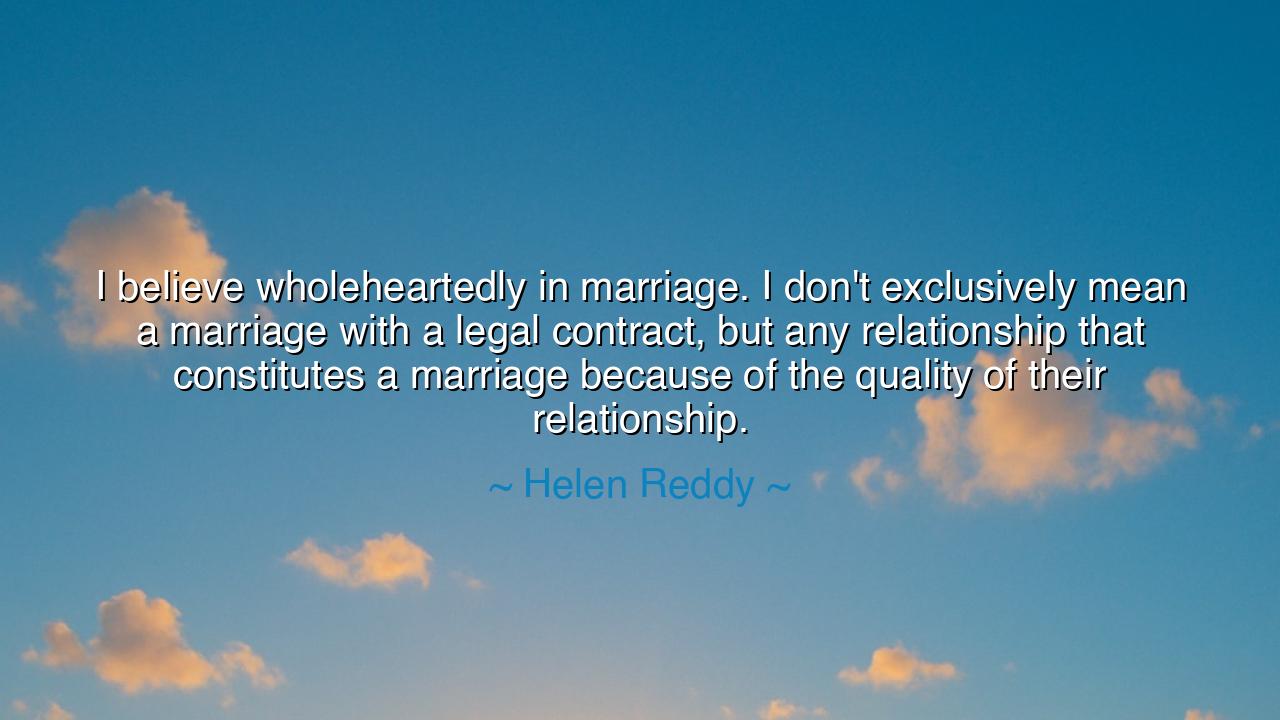
I believe wholeheartedly in marriage. I don't exclusively mean a
I believe wholeheartedly in marriage. I don't exclusively mean a marriage with a legal contract, but any relationship that constitutes a marriage because of the quality of their relationship.






The words of Helen Reddy, the voice of strength and freedom in her era, reach beyond the boundaries of law and custom: “I believe wholeheartedly in marriage. I don't exclusively mean a marriage with a legal contract, but any relationship that constitutes a marriage because of the quality of their relationship.” In these words, she casts aside the narrow walls of legality and speaks instead to the essence of union, to the bond of souls that transcends paper, seal, or decree. She declares that marriage is not merely written in statutes but is lived daily in the tenderness, loyalty, and depth of two lives entwined.
Her insight arises from a wisdom as old as humankind. Long before priests or magistrates codified vows, men and women—and, in truth, all partners in love—joined together by trust, affection, and shared destiny. The quality of the relationship, not the stamp of authority, was the true seal of permanence. Reddy reminds us that what sanctifies a union is not the signature of law but the endurance of compassion, sacrifice, and joy shared.
History, too, offers us testimony of this truth. Consider the tale of Abigail and John Adams, who lived in an age when contracts and law governed much. Their marriage, however, was far greater than a legal bond. Their letters, written across years of separation, reveal devotion, equality of mind, and mutual respect that outshone mere obligation. Though their union was recognized by law, it was the quality of their relationship—the partnership of equals—that made it shine across centuries as an example of what true marriage means.
In contrast, how many unions have been blessed by law but hollow in spirit? A contract can bind names together, but it cannot breathe life into hearts. Many marriages recognized by legal contract crumble, for the root of relationship lies not in legality but in the soil of sincerity. Reddy’s words pierce to this core truth: marriage is measured not by legality but by love’s daily labor.
Her message carries also a powerful liberation. For she speaks not only of traditional marriages but of all unions that embody commitment and care. By lifting quality of relationship above legal recognition, she opens the circle to those whom law has long excluded or delayed: couples joined by devotion, same-sex partners once denied the right to marry, or companions who choose union without the state’s involvement. In her wisdom, what matters is not recognition by authority, but recognition by the heart.
The lesson here is profound: if we are to honor marriage, let us honor it first in its essence. Let our vows be spoken not only before witnesses but before conscience. Let the measure of our union be the patience with which we endure storms, the laughter with which we share light, the loyalty with which we remain true. A legal bond may strengthen this, but it cannot replace it. To build a union only on legality is to build on sand; to build it on love and respect is to build on rock.
So, children of tomorrow, remember Helen Reddy’s teaching: cherish the quality of your relationships above all. Seek depth, not formality; truth, not ceremony; devotion, not mere obligation. If you marry, let it be because your hearts already live as one. And whether blessed by law or not, let your relationship be marked by honor, kindness, and strength. For in the end, it is not contracts that make a marriage holy—it is love lived faithfully, day by day, in the quiet and heroic work of two souls bound together.






AAdministratorAdministrator
Welcome, honored guests. Please leave a comment, we will respond soon